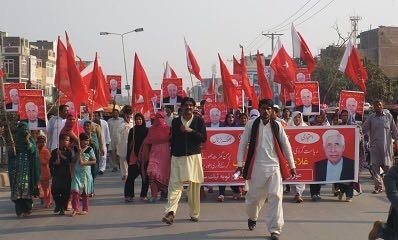For the first time, army has admitted that they do not own Okara Military Farms agriculture land.
Farooq Tariq
In a first, the army has admitted that the Punjab government owns the Okara Military Farms, paving the way for granting ownership of the land to the tillers and an end to intimidation and coercion of their leaders.
This came to fore when the Okara Military Farms Commandant Brigadier Rana Mohammed Fahim informed the National Commission for Human Rights (NCHR) during a hearing on December 31.
The NCHR had asked the government, military, tenants and civil society representatives to appear before it and explain their stances in a hearing on the 18 years old dispute over the ownership of the military farms.
The military has also accepted the NCHR mediation to resolve the issue. Next hearing will be held on January 17.
The army officials told the commission that they would wave off the 18 years debts of tenants who are not paying the share cropping rent but they have to pay that now.
The AMP representatives have informed the commission that they do not owe share cropping rent to the Okara military farm administration since it does not own it.
They contended that the Punjab government should negotiate with the tenants directly as the later owned the land. They said that the land should be distributed among the tenants.
The statement from the Okara Military Farms commandant supports the tenants’ position on land rights that the land is not owned by the army. However, military officials have never admitted this fact on record before.
I had approached the NCHR in 2016 to take notice of the ongoing human rights violations in Okara.
Thirteen tenants at the military farms have lost their lives during this mass movement for ownership of land they are cultivating for over 100 years. Around 1,900 tenants including over 200 women have been jailed over the last few years. Three of the main leaders of the Anjuman Mozarain Punjab (tenants association) including AMP general secretary Mehar Abdul Sattar and Younas Iqbal are in jail serving 10-year jail sentence on fake cases.
Sattar, who is also joint secretary of Pakistan Kissan Rabita Committee, a network of peasant organisations and a member of La Via Campisena, “the peasants way” or the International Peasants Movement is serving 10-year sentence in Sahiwal jail.
AMP leader Malik Salim Jakhar was released last week on bail on the order of the Supreme Court of Pakistan after spending almost four years in jail. He had been framed in 84 fabricated cases since 2006.
AMP media adviser and Union Council chairman Noor Nabi was released in the last weeks of December 2018 after spending almost 19 months in jail. Hussain Raza, a local journalist, who was reporting on the peasants movement for a national Urdu daily was released after spending 23 months in jail last year.
Most of these leaders were arrested on false charges of murder, attempt of murder, robbery, theft and blocking roads after the tenants had refused to pay the share cropping rent since 2001.
Despite intimidation, harassment and coercion, by the police and security personnel, only 10 percent of the tenants have agreed to pay share cropping rent. Ninety percent are still resisting the pressure.
The tenants have been cultivating over 68,000 acres of land in different parts of Punjab. In the face of worst kind of state repression, the tenants are firm in their demand for land rights and continue their movement.
The army’s acceptance that they do not own own the agriculture land at Okara is a step towards the success of the campaign for land rights.
The writer is general secretary, Pakistan Kissan Rabita Committee and spokesperson of Awami Workers Party.

The High Asia Herald is a member of High Asia Media Group — a window to High Asia and Central Asia

